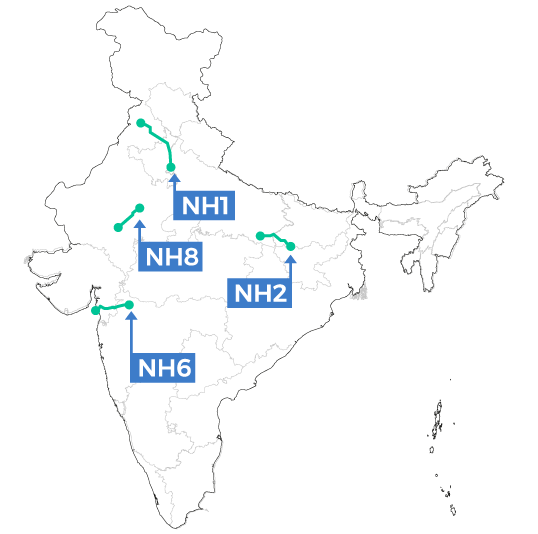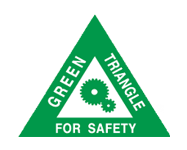
ROADIS is the largest European manager of highway concessions in the country
Our reputation is supported by both our strong operational capabilities and the network of strategic alliances we have developed. All of our existing assets in India are currently in operation and significant milestones have been reached in the completion of projects.
707
4
74,470
India is a key market for our growth, considering that we already manage more than 700 km in the country.
ANNUAL REPORT / NATIONAL SITUATION / INFORMATION ABOUT THE SECTOR /
In India, ROADIS focuses on the management of existing assets in the country and works to acquire long-term stable projects: an objective that extends to other countries in the Asia-Pacific region.
ROADIS is currently the biggest European road concession operator in India. We enjoy a solid position in the country as a result of the knowledge and experience acquired in terms of project development and management in the market. We are partners of the National Investment and Infrastructure Fund (NIIF) in a joint platform that will invest in road projects in India.
India is a key market for our growth, considering that we already manage more than 700 km in the country. We are one of the main highway developers, with proven experience in the field. Our reputation is based on solid operational capacity and the network of strategic alliances we have developed. All the assets in India are in the operational phase and have already reached significant milestones in the completion of their projects.

In addition, existing assets have shown strong resistance to the COVID-19 pandemic: in December 2020, traffic has recovered to levels similar to December 2019; and some assets have even exceeded the traffic levels in December 2019.
In 2020, significant progress was made in resolving the problems inherited from the assets, including the following:
- We have successfully selected a new EPC contractor to complete the remaining construction work for the NH-2 project. Furthermore, significant progress has been made in completing the key terms and conditions for the remaining construction work in the affected areas and the Supplementary Concession Agreement is expected to be signed in the first half of 2021.
India has been one of the fastest growing economies in the world, with average growth of ~7% from 1999 to 2019. Despite a severe decline in 2020 due to the COVID-19 pandemic, a robust economic recovery is expected, with growth of 10-11% in the 2022 financial year.
As general inflation remains subdued and interest rates decrease, investments are expected to accelerate.
The stability of central government improves confidence in industry progress through coherent political measures. The political stance has been business-friendly and India has made progress in terms of governance and regulatory frameworks. It has also remained stable with regard to transparency and the processing of public infrastructure projects.

The government has launched improved P3 models, actively exploring more balanced risk-benefit distributions: TOT, HAM, InvITs.
The NHAI has proposed changes to the BOT model to reactivate private sector investment, with the main modifications related to limiting the liabilities of either party, the tightening of conditions prior to declaration of the designated date and modification of the dispute resolution system.
In addition, the Hybrid Annuity Model (HAM) has been revised, replacing the banking interest rate with the MCLR for calculating the interest rate of annuities in the new HAM assets, in order to protect the returns of HAM developers.
The road asset withdrawal policy for the original bidders has also been modified, allowing withdrawal from the project 1 year after the start of the commercial operation (instead of the initial two years).
The Government has been receptive to industry comments on InvITs and has adapted their regulations in order to encourage private sector participation, as the InvITs offer a tax efficient investment mechanism.

Road construction in India experienced growth of 21.44% (CAGR) between the 2016 and 2019 financial years, due to growing demand, political support and investment.
In the 2021 financial year, 13,298 km of highways were built, compared to 10,240 km in 2020, which resulted in year-on-year growth of 30% and a rate of 36.4 km per day.
For the future, the government's outlook on the road sector seems promising, with 1.2 billion euros allocated to the National Infrastructure Project for the 2019-25 financial years, under which the road sector is expected to account for 18% of capital expenditure.
In addition, the National Highways Authority of India (NHAI) is ready to launch India's first InvIT (Infrastructure Investment Fund), sponsored by the Government in the first half of 2021, with 5-6 road projects worth 560 million euros.
Bharatmala Pariyojana, the government's umbrella programme for the road sector, aims to develop 34,800 km of roads for 2022 in Phase I, with an estimated cost of 60 billion euros, of which 2,921 km have already been built in August 2020.
In addition, the Government has embarked on the construction of the Delhi-Mumbai Expressway, a 1,250-km controlled access highway that connects the national capital, Delhi, with India’s commercial capital, Mumbai. It is expected to be completed by 2024.
The future prospects of the road industry remain solid. The NHAI plans to award projects worth 25 billion euros in the 2022 financial year and the hybrid annuity model (HAM) is expected to obtain the majority of the awards, followed by engineering, procurement and construction (EPC).
The percentage of EPC in the awards last year was 50%, followed by HAM, with 49%; and only two projects were awarded using the build, operate and transfer model (BOT).
In addition, Indian assets have proven to be very resistant to COVID-19 closures; and, in August 2020, traffic had already recovered by 85-90%, in line with pre-pandemic traffic levels, mainly due to the accumulated demand for heavy vehicle traffic.
HOW DO WE CREATE VALUE IN OUR COMMUNITIES?
Each one of the ROADIS assets in India has created significant opportunities for direct and indirect jobs in their communities. Thanks to the high-quality transport network provided by our roads, communities in the areas of operation have improved access to infrastructure and basic socio-economic services (markets, schools, health centres etc.), thus reducing travel times and costs.
Our team in India supported the fight against the pandemic by developing an innovative idea to raise funds for PM CARES (Prime Minister's Citizen Assistance and Relief in Emergency Situations Fund). Our team members contributed voluntarily to this noble cause; and ROADIS also matches the total contribution made by all employees. With this idea, the company collected 15.83 lakhs from employees and contributed 15.78 lakhs from its own funds. Thus, we have contributed a total of 31.61 INR lakhs to the PM CARES fund to help the nation in difficult times. At ROADIS, we work to develop the highway network in India, and we uphold our commitment to the environment and communities where we operate.
In 2020, we carried out the following campaigns to raise awareness about health and safety:
• Road Safety Week (Feb-2020)
• National Safety Week (Mar-2020)
• World Environment Day (June-2020)
• Global Road Safety Campaign (Mar-20, Aug-20, Dec-20)
Associations to which the SBU belongs





Other ROADIS projects












